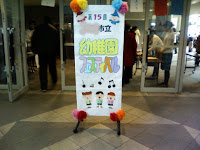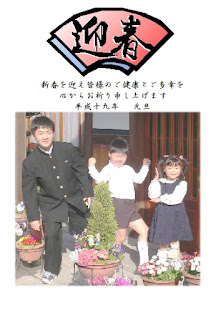Sunday, January seventh, two thousands and seven
Let me introduce one of Japanese customs to you below.
Most Japanese people visit shinto shrines and Buddhist temples for their new year's visit, to pray for prosperity, happiness, health and something like that. And then, most of them obtain "Omikuji(s)" there, which are written oracles and tell you about your fortune of this year - such as marriage, health, business and wealth. "Omikujis" indicate your fortune from extremely good(大吉 daikichi) to extremely bad(大凶 daikyou) and suggest what to do afterwards. If the Omikuji you get indicates a good fortune, you should bring it home. But if it's a bad one, you should tie to a branch of a tree in the shrine or the temple in order not that the bad fortune doesn't annoy you after that.
Actually, I don't believe such fortunes, that's why I rarely obtain Omikujis. Plus if I get a bad one, I'll positively think I'm so lucky. Because there tend to be few bad ones in Omikuji boxes, so getting a bad Omikuji is sort of a proof that I'm a lucky person. :) And also I don't like most fortune tellers, especially I dislike Kazuko Hosogi, who is a very famous female fortune teller in Japan and often appears on TV. In spite of she has got divorced before, she often tells TV personalities about their fortune strongly and aggressively as if she knows all about the ins and outs of them. I am sick and tired of seeing her face on TV.
Anyway, luck is what happens when preparation meets opportunity, as a witty remark(famous saying, maxim) says. I saw this interesting English remark on an email newsletter the other day, actually. This saying sounds similar to a Japanese common saying, "運も実力のうち Un mo jitsuryoku no uchi.", which maybe means that luck is included in your ability in Japanese.
as if : あたかも~のように
ins and outs of something: ~の一部始終(直訳:内側も外側も)
be sick and tired of something: ~には、もううんざりだ
witty remark(famous saying, maxim): 名言









